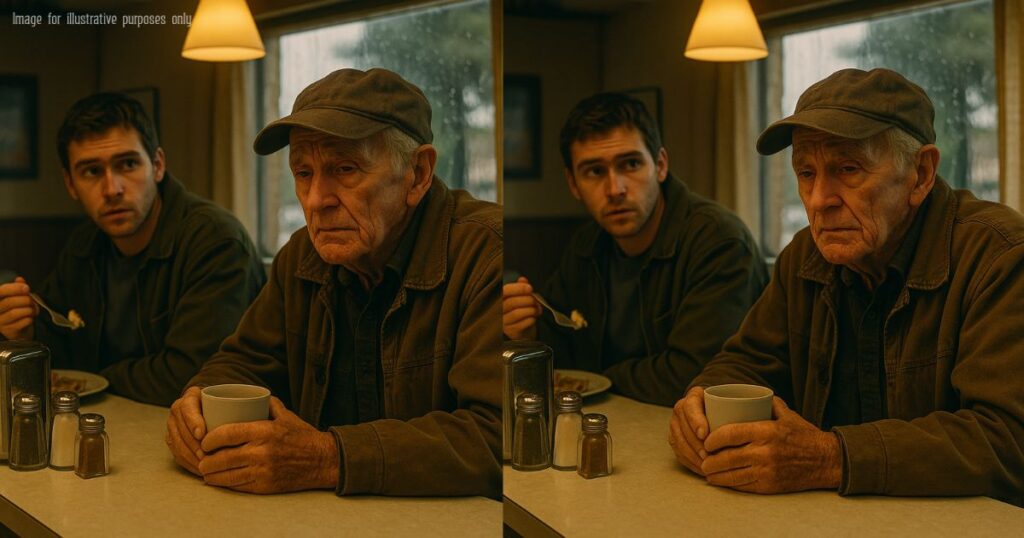The young man nodded, slowly. “I served two years. Infantry. Afghanistan.”
The old man didn’t speak. Just nodded once, deeply. As if they’d crossed the same river, at different times.
“I saw things too,” the young man said. “Heard things. Guys doing stuff they shouldn’t. But we were taught not to stir the water. Don’t write it up. Don’t bring it back.”
“Different uniform,” the old man murmured. “Same rulebook.”
The young man reached for the envelope.
“Are these… confessions?”
“No,” said the old man. “They’re apologies. Truths. Maybe even blessings, if someone’s willing to hear them. I figure, it’s never too late to try.”
The envelope felt heavier than it should. It was sealed with a single strip of old Scotch tape. Inside, he could feel individual pages, thick with ink. Maybe even a photo. Or two.
“First one’s for my daughter,” the old man said. “She used to call every Sunday. After her mama died, I didn’t know how to talk to her. Just kept saying, ‘I’m fine.’ Every call. For ten years. Then she stopped calling. I want her to know it wasn’t her fault.”
The young man blinked, then tucked the envelope into his bag.
The waitress came over and refilled the old man’s coffee. She said nothing but gave his shoulder a gentle squeeze before walking away. Maybe she’d heard it all before. Or maybe she was just another witness to a man trying to unbury himself before the dirt settled.
“Where do I send them?” the young man asked.
“There’s a list inside,” the old man said. “Addresses. Names. One of them’s mine, in case you feel like writing back. Not that I expect anything.”
He chuckled — dry and hollow — and then looked out the window like he saw something long gone.
The rain had stopped.
“You said you’re dying?” the young man asked softly.
“Lungs full of ash,” the old man said. “From the days before masks, when we stood next to the boiler room without complaint. Thought it made us tough. Turns out, it just makes you quieter when you go.”
There was a long silence then, but not the painful kind. Just two men, one at the end, one near the start, letting time pass between them like a train they’d both missed.
Then the old man stood, slowly. His knees cracked. He reached into his coat and pulled out a crumpled five-dollar bill, which he placed under the coffee cup.
“I gotta get going,” he said. “They say you know when it’s close. I feel it in my ribs now. Like a dog laying down in the last sun.”
The young man stood too. Not out of politeness — something deeper.
“Thanks,” the young man said, voice low. “For saying it.”
The old man turned, eyes damp but clear. “Don’t wait forty years to say your piece, son. This world’s got too much silence already.”
And with that, he walked out. No drama. No goodbye. Just a slow figure disappearing into the gray morning.
The young man sat back down. He pulled the envelope from his pack and opened it.
Inside were seven letters. Each one labeled in tidy cursive. One said To my daughter — who was always braver than me. Another: To the man in the mirror. One, yellowed and folded separately, read: To the one who finally listened.
He opened that one first.
If you’re reading this, it means you didn’t turn away. Thank you. Not just for me — but for the ones I failed. This is my last attempt at truth. Do with it what you will. But whatever you do — don’t stay quiet when the moment comes. Speak. Even if your voice shakes.
The young man folded it back and put it in his pocket.
Two weeks later, the young man stood outside a small house with peeling paint and a garden that hadn’t seen love in years. He held the envelope in one hand, a printed map in the other. The name on the mailbox matched one of the letters: Angela Morse.
He rang the bell.
A woman in her fifties answered. Tired eyes. Cautious face.
“Ma’am,” he said. “I have something from your father.”
She blinked. Took the letter like it was radioactive.
“I didn’t even know he was still alive,” she said softly.
“He passed a few days ago,” the young man said. “But he wanted you to read this.”
Her hands trembled as she opened it.
He turned to go, but she called out.
“Did he say anything else?”
The young man smiled, just a little. “He said… he wished he’d spoken sooner.”
She stared down at the letter, and her lip quivered.
Behind her, a small dog barked. Wind stirred the dry leaves. Somewhere down the block, a lawnmower sputtered to life.
Life, going on.
He hadn’t saved the world. But maybe—just maybe—he’d helped carry one man’s truth a little farther than silence ever could.


